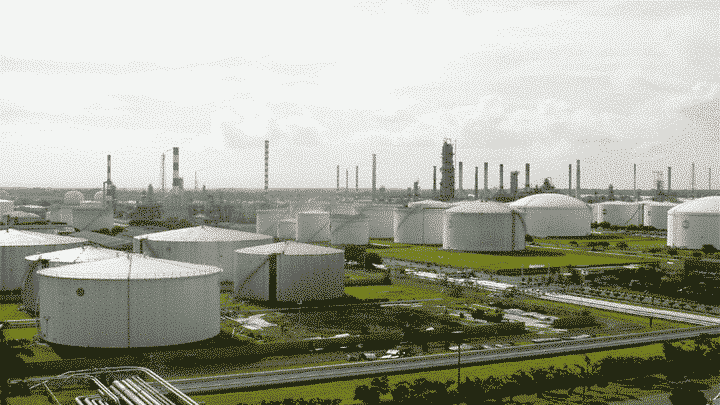Indonesia’s state-owned PT Pertamina has let a contract to Honeywell UOP LLC to license process technologies for projects aimed at equipping two of its existing domestic refineries to begin production of advanced renewable fuels.
As part of the contract, UOP will deliver technology licenses, basic engineering, specialty equipment, catalysts, and training for both projects, which include construction of a new biorefinery at Pertamina’s 118,000-b/d Plaju refinery in Palembang, South Sumatra, as well as the revamp of its 348,000-b/d Cilacap refinery in Central Java to enable production of biofuels, the service provider said.
Specifically, UOP will license its proprietary UOP Renewable Jet Fuel Process for the proposed Plaju biorefinery, which will process 20,000 b/d of vegetable oils and fats to produce advanced biofuels such as renewable jet fuel, renewable diesel fuel, and green LPG.
At the Cilacap refinery, UOP said it will implement its proprietary Ecofining technology as part of a revamping project that will allow the refinery to process 6,000 b/d of vegetable oils and fats to produce unspecified advanced biofuels.
The planned renewable-fuels projects at Pertamina’s Plaju and Cilacap refineries come as part of Pertamina’s strategy to meet the Indonesian government’s goals for renewable fuel production using domestic biobased feedstocks, including the requirement that more than 5% of all domestic energy must come from biofuel by 2025, according to UOP.
“The development of our biorefinery in Plaju and [revamp at] Cilacap [are] part of our plan to diversify our products while at the same time to show our commitment to sustainable energy,” said Budi Santoso Syarif, deputy chief executive officer of PT Kilang Pertamina International, the subsidiary responsible for the company’s refinery and petrochemical businesses.
UOP, however, disclosed no further details regarding the proposed projects.
As the world’s fourth most populous nation, with 250 million people, Indonesia imports about 1.5 million b/d of refined products, roughly 30 percent more than its domestic production capacity, according to UOP.
The additional biofuel production capacity to be provided by the Plaju and Cilacap refineries will help to reduce the nation’s reliance on imported petroleum products—particularly low-sulfur fuels—while simultaneously supporting the local bioeconomy and rural employment opportunities in agriculture, the service provider said.
Ongoing renewables development
Despite its recent award for biofuel production projects at Plaju and Cilacap, Pertamina’s transition to production of renewable fuels via coprocessing, standalone units, and existing unit conversions has been under way for some time now, both at its Plaju and Cilacap refineries, as well as at its 170,000-b/d Dumai refinery in Riau, according to a series of recent Indonesian-language releases from the operator.
In July, the Dumai refinery began 1,000-b/d production of green diesel (D-100) using 100% refined, bleached, and deodorized palm oil (RBDPO) following a pilot program that began at the site in December 2014 and entered official production in December 2018 with gradual injection of varying percentages of RBDPO and help of the Merah Putih catalyst made by the Research & Technology Center of Pertamina and Institut Teknologi Bandung (ITB), Pertamina said in releases dated Aug. 16, 2020 and July 23, 2020.
The Plaju refinery’s production of D-100—which is mixed with biosolar environmentally friendly fuel (B-20) and vegetable oil, or fatty acid methyl ester (FAME)—is proven to produce higher-quality diesel fuel with a higher cetane number, according to Pertamina.
Production of green gasoline from 20% injection of RBDPO also has been successfully tested at the Plaju and Cilacap refineries in 2019-20, said Nicke Widawati, Pertamina’s managing director, adding that—while other companies have processing palm oil into green diesel—Pertamina is the first to accomplish the feat for green gasoline production.
Regarding the newly awarded technology licensing contract award to UOP for the proposed Plaju and Cilacap biofuel projects, Widawati said Pertamina’s plan is to build a standalone biorefinery at both the existing Plaju and Cilacap refineries. The two new standalone refineries will produce both green diesel and green aviation fuel from 100% vegetable oil, Widawati confirmed.
The current UOP contract award for the Cilacap refinery likely covers only the proposed revamp of a single unit at the site. Part of Pertamina’s renewables-production-by-conversion-of-existing-equipment schema, the planned project entails modifying an idled unit at Cilacap to enable processing of 100% palm oil into green diesel, Joshua Nababan, Permamina’s senior vice-president for business development said in a Mar. 17, 2020, release.
The operator has yet to reveal details about the proposed standalone biorefinery at Cilacap.
Pertamina, however, also is currently preparing the Cilacap refinery by yearend 2020 to be able to test production of green aviation fuel via coprocessing injection of 3% RBDPO, according to Widawati. Details of that project also have yet to be disclosed.
Targeted for completion in 2024, Pertamina’s Green Refinery program comes as part of the company’s effort to realize Nawacita, which entails maximizing use of all of Indonesia’s domestic natural resources—including its abundant palm oil resources—to build national energy security, independence, and sovereignty, the operator said.
Widawati said, in the future, plans to develop green energy not only from palm oil but also from other resources such as algae, wheat, sorghum, and more, in line with expectations that growth of new and renewable energy will exceed that of traditional fossil energy by 2030.
RDMP update
Alongside its ongoing development of renewables-based fuels, Pertamina’s refining division is continuing to execute mix of brownfield and grassroots projects across its existing system as part of its Refining Development Master Plan (RDMP) (OGJ Online, Jan. 24, 2020).
In its latest update on the program, Pertamina said it is currently executing site preparation activities, selecting licensors, and revising basic engineering design on its Cilacap RDMP project, which aims to increase capacity of the refinery to 400,000-b/d from 348,000 b/d as well as improve quality of finished products to Euro 5-quality standards from their present Euro 2-quality specifications.
Scheduled to be completed in 2025, the Cilacap RDMP project is slated to be on stream in 2026, Pertamina said in its latest annual report.
